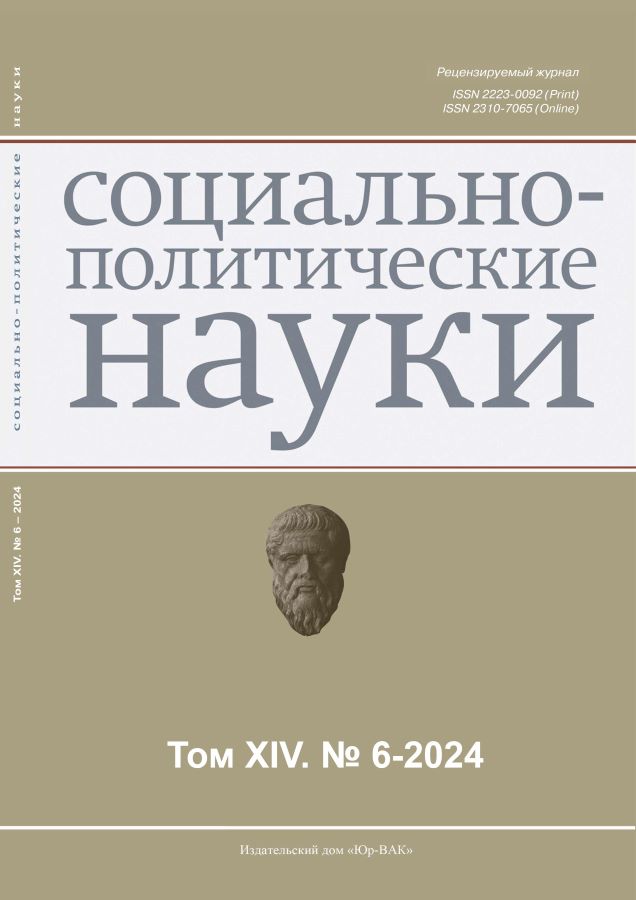Role of trust in political and cultural life of society – a socioeconomic prospective
- 作者: Proskurina A.S.1
-
隶属关系:
- Financial University under the Government of the Russian Federation
- 期: 卷 14, 编号 6 (2024)
- 页面: 210-216
- 栏目: Sociology of management
- URL: https://journals.eco-vector.com/2223-0092/article/view/654095
- DOI: https://doi.org/10.33693/2223-0092-2024-14-6-210-216
- EDN: https://elibrary.ru/FAALTP
- ID: 654095
如何引用文章
详细
Trust is an effective way to reduce tensions between social groups, and also acts as a tool for creating alternatives to formal structures of interactions, which is especially relevant for modern economic relations. The purpose of this article is to characterize the significance of cultural and political components in the formation of trust in this sphere. The crisis of trust is presented as a context that combines actors of different levels and forces them to care not only about economic success, but also about reputation, public good, digital footprint and interaction with the state. The multifaceted nature of the crisis of trust makes the task of mitigating and overcoming it one of the key tasks for the actors of economic relations. The study suggests effective approaches to building and maintaining trust in the challenging environment of interactions.
全文:
作者简介
Aleksandra Proskurina
Financial University under the Government of the Russian Federation
编辑信件的主要联系方式.
Email: ASProskurina@fa.ru
ORCID iD: 0000-0002-2108-1415
SPIN 代码: 3551-1169
Scopus 作者 ID: 57213195604
Researcher ID: JBJ-7384-2023
Cand. Sci. (Sociol.), leading researcher, Institute of Humanitarian Technologies and Social Engineering
俄罗斯联邦, Moscow参考
- Bolshakova Yu. The category of “trust” and its use to assess the effectiveness of public administration. Society and Economy. 2022. No. 5. Pp. 77–87. (In Rus.). doi: 10.31857/S020736760020122-3.
- Burdaitskis I. The world that Huntington built and in which we all live. Paradoxes of the conservative turn. Moscow: Tsiolkovsky, 2020. 160 p.
- Bylevsky P.G., Tsatskina E.P. Phenomenological analysis of the phenomenon of “cancel culture”. Bulletin of the Moscow State Linguistic University. Humanities. 2022. No. 2 (857). Pp. 162–169. (In Rus.). doi: 10.52070/2542-2197_2022_2_857_162.
- Valiakhmetov I.R., Ulshina E.V., Livintsova E.A. Problems and trends in the development of microfinance organizations in the context of the economic crisis. Industrial Economy. 2022. Vol. 7. No. 5. Pp. 675–679. (In Rus.)
- Weber M. The Protestant ethic and the spirit of Capitalism. In: Selected works. Transl. from Germ. Yu.N. Davydova (comp., gen. ed. and afterwords); P.P. Gaidenko (foreword). Moscow: Progress, 1990. P. 200.
- Vlasova A.V., Tyurikov A.G., Dronova A.S. et al. The phenomenon of trust in domestic scientific discourse. Humanities. Bulletin of the Financial University. 2022. Vol. 12. No. 5. Pp. 70–78. (In Rus.). doi: 10.26794/2226-7867-2022-12-5-70-78.
- Voevodina E.V. Reputation Mechanisms for Building Trust in an Inclusive Economy. VEPS. 2024. No. 3. Pp. 192–196. (In Rus.). doi: 10.24412/1998-5533-2024-3-192-196.
- Voevodina E.V., Ten Yu.P., Tyurikov A.G. Sociocommunicative aspects of ideas about trust of undergraduate students of Moscow universities. Sociopolitical Sciences. 2023. Vol. 13. No. 1. Pp. 119–128. (In Rus.). doi: 10.33693/2223-0092-2023-13-1-119-128.
- Zelenkov M.Yu., Tyurikov A.G. Model of challenges to trust in the modern Russian Federation. Sociodynamics. 2022. No. 2. Pp. 26–43. (In Rus.). doi: 10.25136/2409-7144.2022.2.37600.
- Kokorev A.S., Shavykin Ya.V. Directions for improving the financial literacy of the population in terms of counteracting modern financial pyramids. Culture and Security. 2022. No. 1. Pp. 47–53. (In Rus.). doi: 10.25257/KB.2022.1.47-53.
- Levina E.V. Socio-economic sources of the crisis of trust in transforming economic relations. Creative Economy. 2024. Vol. 18. No. 1. Pp. 59–74. (In Rus.). doi: 10.18334/ce.18.1.120274.
- Podolsky V.A. Analysis of the differences between traditionalism and conservatism using the example of the luddite movement. Society and Power. 2018. No. 4 (72). Pp. 28–40. (In Rus.)
- Proskurina A.S. Building trust in economic relations: political and cultural aspects. International Research Journal. 2024. No. 8 (146). (In Rus.). doi: 10.24158/tipor.2022.8.5.
- Tyurikov A.G., Dyagilev V.V., Kuleshov S.M. Trust in the system of assessing the effectiveness of intercultural communication. Communicology. 2022. Vol. 10.No. 2. Pp. 69–83. (In Rus.). doi: 10.21453/2311-3065-2022-10-2-69-83.
- Bolten J. Intercultural business communication: An interactive approach. In: Exploring the rhetoric of international professional communication. L.: Routledge, 2020. Pp. 139–155.
- Fitzmaurice G.G. The foundations of the authority of international law and the problem of enforcement. The Modern Law Review. 1956. Vol. 19. No. 1. Pp. 1–13.
- Grishaeva S., Beregovskaya T., Smbatyan S. Generation Z is the first “digital” generation in the labor market. In: CSIT Conference. 2023. Pp. 25–30. doi: 10.51408/csit2023_65.
- Hirsch B.T., Addison J.T. The economic analysis of unions: new approaches and evidence. Taylor & Francis, 2024.
- Hofstede G. Dimensionalizing cultures: The Hofstede model in context. In: Online readings in psychology and culture. 2011. doi: 10.9707/2307-0919.1014.
- Inkeles A. Industrialization, modernization and the quality of life. In: Ecology, world resources and the quality of social life. Routledge, 2022. Pp. 51–79.
- Lammert C., Vormann B. When inequalities matter most: The crisis of democracy as a crisis of trust. In: Mobilization, representation, and responsiveness in the American democracy. 2020. Pp. 139–156.
- Weber M. Economy and society: An outline of interpretive sociology. Berkeley: University of California Press, 1978. 1469 p.
- Štulajter M. Problem of enforcement of an international law – analysis of law enforcement mechanisms of the United Nations and the World Trade Organization. Journal of Modern Science. 2017. Vol. 33. No. 2. Pp. 325–335.
补充文件








